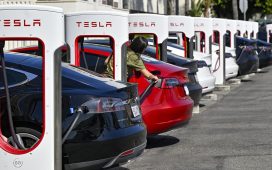Workers assemble cars at a plant in Chicago, June 24, 2019.
Jim Young | AFP | Getty Images
U.S. auto sales are expected to fall at least 15% this year as the country implements more aggressive restrictions to prevent the spread of the coronavirus, threatening an already-stressed autos industry, according to new research from IHS Markit.
The COVID-19 pandemic that has spread to nearly every country on the globe has forced a number of governments to implement drastic measures to slow its spread. This has posed the single biggest risk factor for the autos industry in years as consumer demand stalls, according to IHS Markit.
IHS Markit forecasts 2020 U.S. auto sales to be 14.4 million units, down by at least 15.3% year-over-year. The global auto sales forecast is expected to decline more than 12% from last year to 78.8 million units, according to IHS Markit, which would be a larger decline than the 8% drop during the Great Recession a decade ago.
“The global auto industry is expected to witness an unprecedented and almost instant stalling of demand in 2020,” IHS Markit said in an emailed report.
IHS Markit expects sales declines in Europe by nearly 14% and in China by 10% year over year.
On Friday, IHS Markit issued new research that found global production of vehicles could fall by more than 1.4 million as auto plants remain closed in Europe, North America and Latin America.
In North America, Ford, General Motors and Fiat Chrysler announced plans to temporarily halt production for nearly two weeks after bowing to pressure from the United Auto Workers Union, which wanted to improve safety protocols to protect employees against the pandemic. Ford later said on Tuesday that it will not reopen its plants in North America on March 30 as originally planned.
The coronavirus has infected more than 428,400 people across the globe with at least 55,225 of those being in the U.S., according to data from Johns Hopkins University.
— CNBC’s Phil LeBeau contributed to this report.








